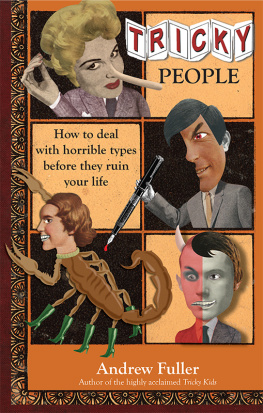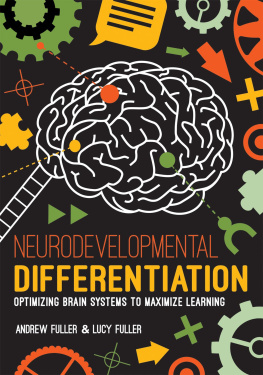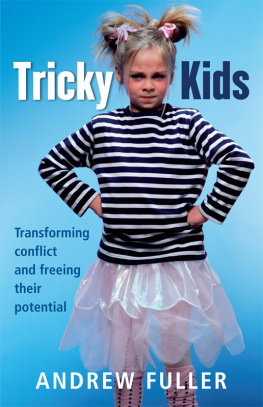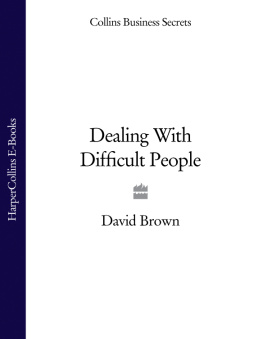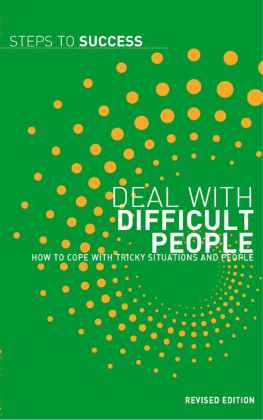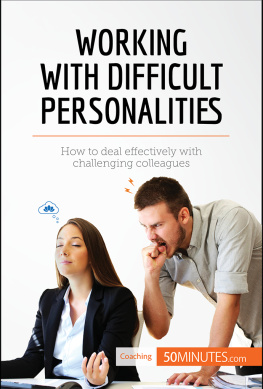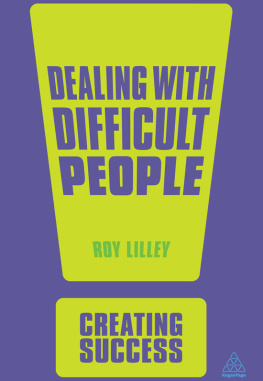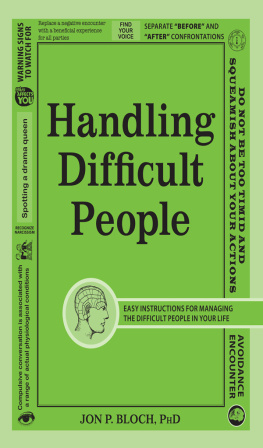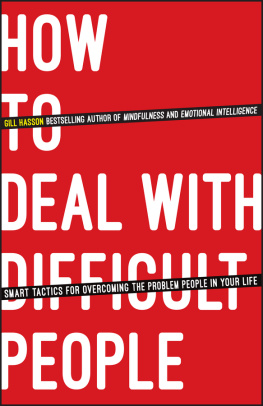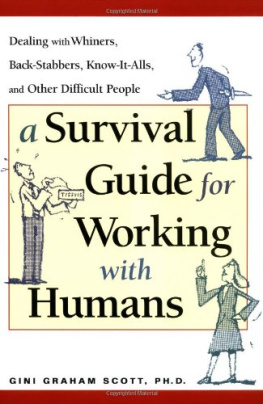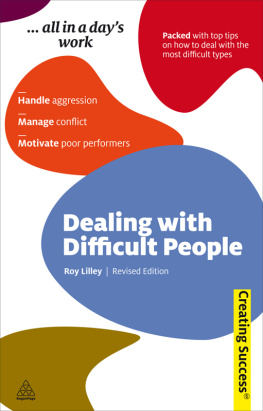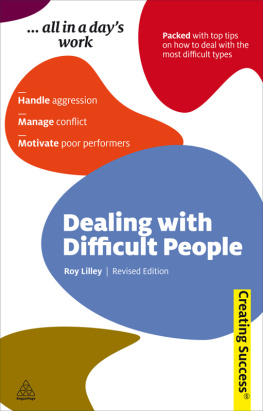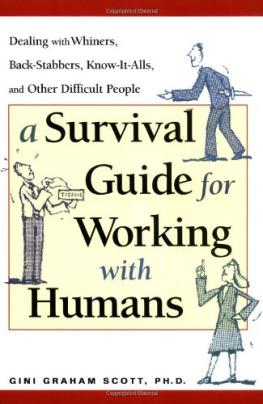. Identifying how you relate to tricky people
. The Back-stabbers and White-anters
. The Blamers and Whingers
. The Bullies and Tyrants
. The Controllers
. The High and Mighties
. The Avoiders
. The Competitors
. The Poor Communicators
. If the tricky person in your life is you
. Office politics a survival guide
. Understanding relationship patterns
. How to make a tricky person your best teacher
This book is dedicated to my tricky muses
Important information While every care has been taken in researching and compiling the information in this book, it is in no way intended to replace professional legal advice and counselling. Readers are encouraged to seek such help as they deem necessary. The author and publisher specifically disclaim any liability arising from the application of information in this book.
HarperCollins Publishers
First published in Australia and New Zealand in 2009
by Finch Publishing Pty Limited, Warriewood, NSW.
This edition published in Australia in 2013
by HarperCollins Publishers Australia Pty Limited
ABN 36 009 913 517
harpercollins.com.au
Copyright 2009 Andrew Fuller
The right of Andrew Fuller to be identified as the author of this work has been asserted by him under the Copyright Amendment (Moral Rights) Act 2000 .
This work is copyright. Apart from any use as permitted under the Copyright Act 1968 , no part may be reproduced, copied, scanned, stored in a retrieval system, recorded, or transmitted, in any form or by any means, without the prior written permission of the publisher.
HarperCollins Publishers
Level 13, 201 Elizabeth Street, Sydney NSW 2000, Australia
31 View Road, Glenfield, Auckland 0627, New Zealand
A 53, Sector 57, Noida, UP, India
7785 Fulham Palace Road, London, W6 8JB, United Kingdom
2 Bloor Street East, 20th floor, Toronto, Ontario M4W 1A8, Canada
10 East 53rd Street, New York NY 10022, USA
National Library of Australia Cataloguing-in-Publication entry
Fuller, Andrew.
Tricky People: how to deal with horrible types before they ruin your life
Includes index.
ISBN 9780732298197 (pbk)
ISBN 9781460701249 (epub)
158.26
Cover design by Ron Monnier
Illustrations by Chris Morgan
Hell is other people .
Jean-Paul Sartre
Y ou probably wouldnt want to sit down and have a cup of tea with many prominent figures in world history, such as Genghis Khan or Attila the Hun, or even Joan of Arc for that matter, but youd have to admit they would be damned handy to have on your side in a scrap.
Tricky people are human dynamite sticks who impact on all that goes on around them exciting, dramatic, powerful and often a right royal pain in the rear-end. Even so, they get things done and they get people talking. When a tricky person does something, it generally stays done. Learn how to harness their skills and passions and you have a secret weapon that makes the Stealth Bomber look, well, a bit second-rate.
If you have one or more tricky people in your life, this book is for you. You may be trying to live with them, work for them, manage them (well, at least attempting to), be part of a family with them, or just trying to co-exist in a semi-harmonious way that wont set off the next world war. Whatever you are trying to do with them, this book will help you firstly identify them, and then provide you with strategies for remaining sane while being with them. In some instances, it will even help you to use the energies of tricky people for your own benefit.
Tricky people are a wild, lurching mob that could at times fall under the banner of:
PEOPLE
TO
AVOID!
However, as we all learn, they arent that easy to avoid. There are plenty of them out there!
Whether they are members of your family, friends or work colleagues, the conundrums they provide can leave you in twists and knots if you are not careful. Very, very careful! They can have you twisting and turning in the middle of the night while they sleep the unperturbed sleep of the guilt-free. They can consume you with fury and toxify your life. You may well end up wailing and gnashing your teeth over their latest exploits.
This book is designed to help you leap over the intricacies of office politics, sidestep the intrigues of family dramas, and rise exultantly from the hotbed of rumour and innuendo. But gird your loins, grab a stiff drink and breathe deeply: your opponents are serious competition. They are scarily used to the world of co-conspirators, deceit, bragging, slashing and burning, and slander Oh, and they are far better at squabbling than you are.
Most of these people, it is fair to say, do not play well as part of a team.
In this book you will learn how to:
| C onduct a costbenefit analysis, and decide whether or not to act |
| H ave a look at your patterns of relating to tricky people |
| Gain | I nsight into your own behaviour |
| L ook for the best outcomes |
| L ook for and select strategies |
| Gain | P erspective-shifting skills |
| I mplement change strategies with tricky people |
| L essen their toxicity, and |
| L earn lessons for the future. |
In one of my previous books, Tricky Kids , I looked at how to parent and teach children who are wilful, spirited and defiant. By the time these kids have become adults, their tricky behaviours have become ingrained as a default position. This means you need even greater skills to deal with them.
Well look at developing these skills in work, romantic, social and family settings.
Work settings
People often report that the most stressful aspect of their job isnt time pressure or the tasks they are required to do, its the people they have to work with. The snide, snivelling ways of some colleagues can not only become depressingly familiar, they can also make you ill. Sadly, it is not only individual co-workers who hold this power; some workplaces have cultures that are toxic.
Organisations have an invasive power over the people within them. They grip and they stick. One of the oddest aspects of organisations is they often behave in ways that are precisely the reverse of their intentions in the world. This is known as their shadow, and it often shows up as the awful and shoddy treatment of workers. It is the dark side of good intentions. And its often the best organisations that have the deepest shadows.
The idea of an organisational shadow helps us to understand why hospital staff are often at bitter loggerheads with one another despite providing wonderful levels of care for their patients. This helps us to understand why mental health and social welfare agencies are often a bit mad, why bankers can become spendthrifts or gamblers, why teachers can bully and belittle one another, and why religious organisations can become places of abysmal inhumanity to their staff despite doing wonderful spiritual work in their communities.
It almost seems that the better intentioned an organisation is, the more likely it is to treat workers badly when the chips are down. Its a bit like a tree: the bigger it is and the more light it basks in, the larger its shadow will be. Of course this means that tricky people can wield enormous sway in these workplaces.
Family settings

